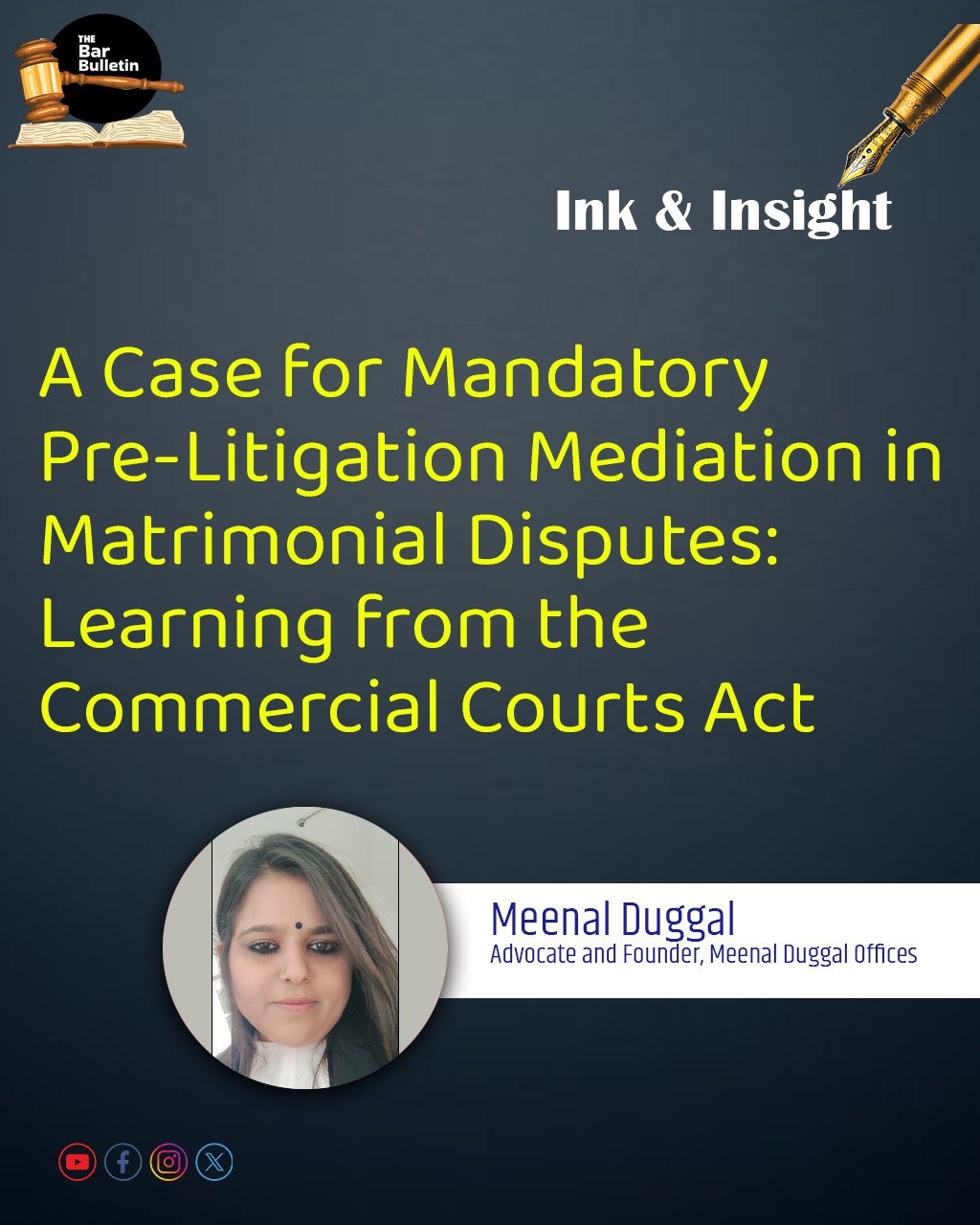The Indian legal system is witnessing a surge in matrimonial litigation, a significant portion of which is either frivolous or arises from misunderstandings that could have been resolved amicably. The adversarial nature of litigation often aggravates personal conflicts rather than resolving them. This article argues that just as pre-institution mediation has been made mandatory under the Commercial Courts Act, 2015, a similar statutory mechanism should be introduced in matrimonial disputes. The objective is to promote reconciliation, reduce pendency, and filter out non-genuine claims at the outset.
In recent years, the Indian judiciary has been flooded with matrimonial cases, ranging from divorce petitions and maintenance claims to allegations of cruelty and domestic violence. The sharp rise in frivolous or retaliatory litigation, often used as a tool to harass or gain leverage, has become a serious concern. Courts are increasingly overburdened with emotionally charged and often petty disputes that consume valuable judicial time and delay genuine cases. This situation calls for a systemic change—a structured, mandatory pre-litigation mediation framework—similar to the one effectively introduced under Section 12A of the Commercial Courts Act, 2015.
The Commercial Courts Act, 2015 mandates pre-institution mediation in all commercial disputes (not involving urgent interim relief) before allowing the matter to proceed in court. The provision has led to reduced case pendency, cost and time savings, promotion of out-of-court settlements, and preservation of business relationships. If such a model can work effectively for commercial disputes—often centered on monetary or contractual disagreements—there is an even stronger case for applying the same principle to matrimonial disputes, which impact the emotional, familial, and social fabric of the parties-involved.
Several studies and judicial observations have highlighted the misuse of matrimonial laws, particularly under provisions such as Section 498A IPC, often used as a tool for vendetta; Section 125 CrPC and the Domestic Violence Act, sometimes misused for exaggerated or unjustified financial claims; and Section 13 of the Hindu Marriage Act, where divorce petitions are filed without genuine intent to reconcile. The Supreme Court in Rajesh Sharma v. State of U.P.[1] emphasized the misuse of Section 498A and directed the formation of Family Welfare Committees to scrutinize complaints before arrests¹. The Justice Malimath Committee Report (2003) also suggested reforms to curb misuse of matrimonial laws[2].
Pre-litigation mediation can play a critical role in this context. Many disputes arise due to communication gaps, emotional impulsiveness, or family pressure. Mediation provides a non-adversarial environment that promotes reconciliation and privacy. It also serves to filter out baseless or retaliatory complaints, facilitates more child-centric outcomes in cases involving minors, reduces the burden on the judiciary, and helps preserve the dignity of the parties involved.
Internationally, countries like Italy and Turkey have implemented mandatory mediation in family law disputes. The UK requires parties to attend a Mediation Information and Assessment Meeting (MIAM) before proceeding to court[3]. Singapore’s dedicated Family Justice Courts also encourage mediation and report high success rates. These global practices offer valuable insights for India in building a structured and effective pre-litigation mediation framework.
Recent judicial observations reinforce the case for pre-litigation mediation. On June 26, 2025, Justice K.V. Viswanathan of the Supreme Court clarified that mediation in matrimonial disputes is not solely intended to reunite estranged couples. It also encompasses amicable separation as a legitimate and dignified outcome. He stated, “In matrimonial matters, the moment we say mediation, the bar feels we are directing the parties to be together. We only want a solution, not insisting on parties to be together. We prefer that the parties are together. But parting ways can also be a solution.” Justice N.K. Singh emphasized the precedent set by mandatory mediation in commercial disputes. Similarly, Justice B.V. Nagarathna publicly advocated for mandatory pre-litigation mediation in matrimonial matters, observing that reconciliation becomes far less likely once disputes reach the courtroom[4].
To implement this reform, a legislative amendment may be introduced by inserting a new section in the Family Courts Act, 1984, making pre-litigation mediation compulsory for matrimonial cases. Alternatively, a central directive or judicial pronouncement under Article 142 could institutionalize this requirement. The mediation process can be overseen by trained family mediators operating through court-annexed or independent centers.
It is also essential to include safeguards. Exceptions must be carved out for cases involving domestic violence, threats to safety, or urgent custody matters. These measures will ensure that mandatory mediation is not misused to delay justice.
In conclusion, as matrimonial disputes continue to rise, causing emotional and institutional stress, India must adopt alternatives to the adversarial system. Mandatory pre-litigation mediation presents a pragmatic, empathetic, and efficient path forward—helping families resolve their issues with dignity, while easing the burden on the judiciary.
* Advocate Meenal Duggal is an independent legal practitioner running her own law office by name Meenal Duggal Law Offices
[1] (2017) 8 SCC 746
[2] Report of the Committee on Reforms of Criminal Justice System (Justice Malimath Committee), 2003
[3] UK’s Family Procedure Rules, Part 3: Mediation Information and Assessment Meetings (MIAM).
[4] See LiveLaw: ‘Justice BV Nagarathna Calls For Mandatory Pre-Litigation Mediation’, June 2025.



